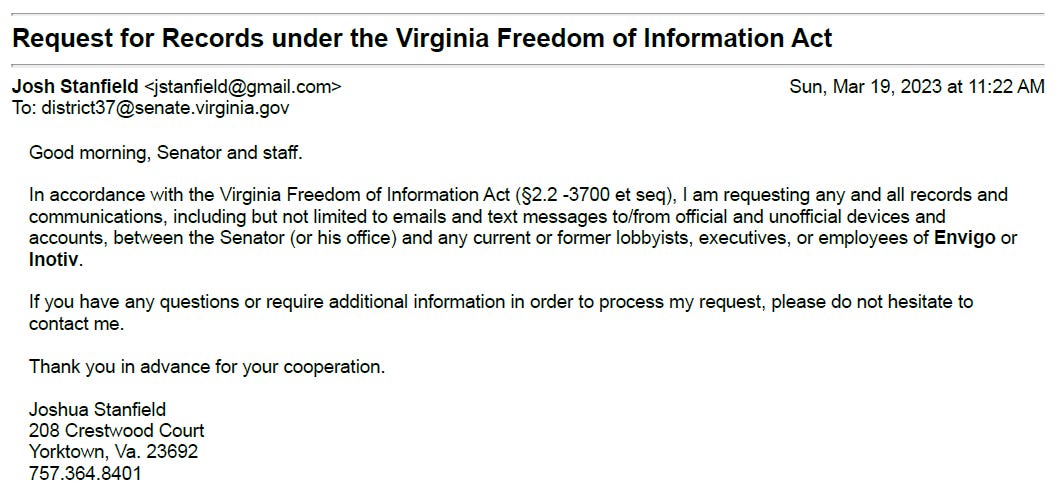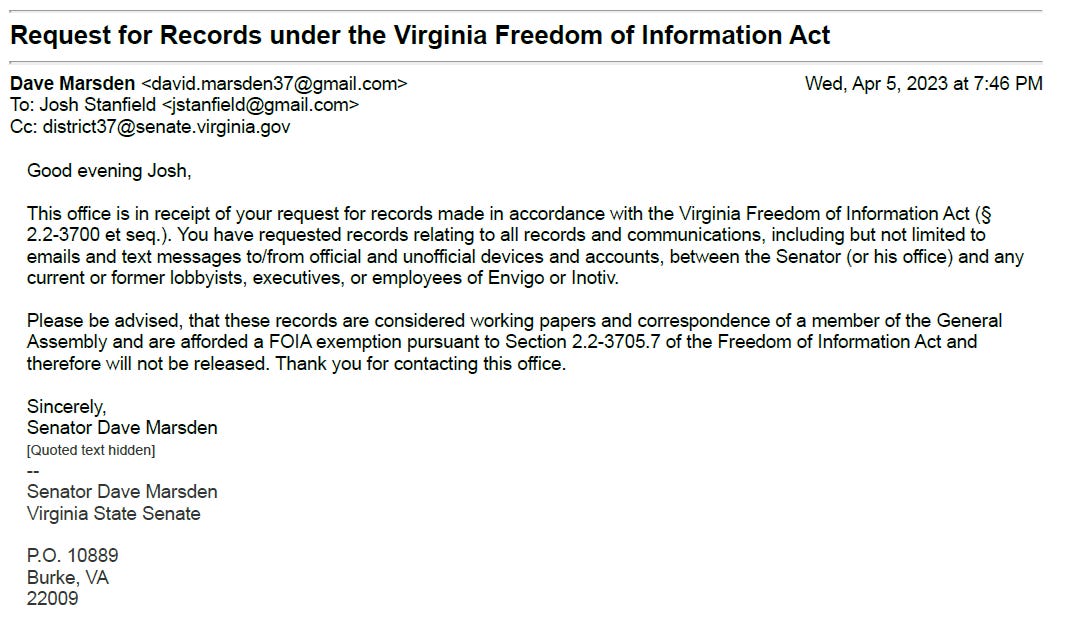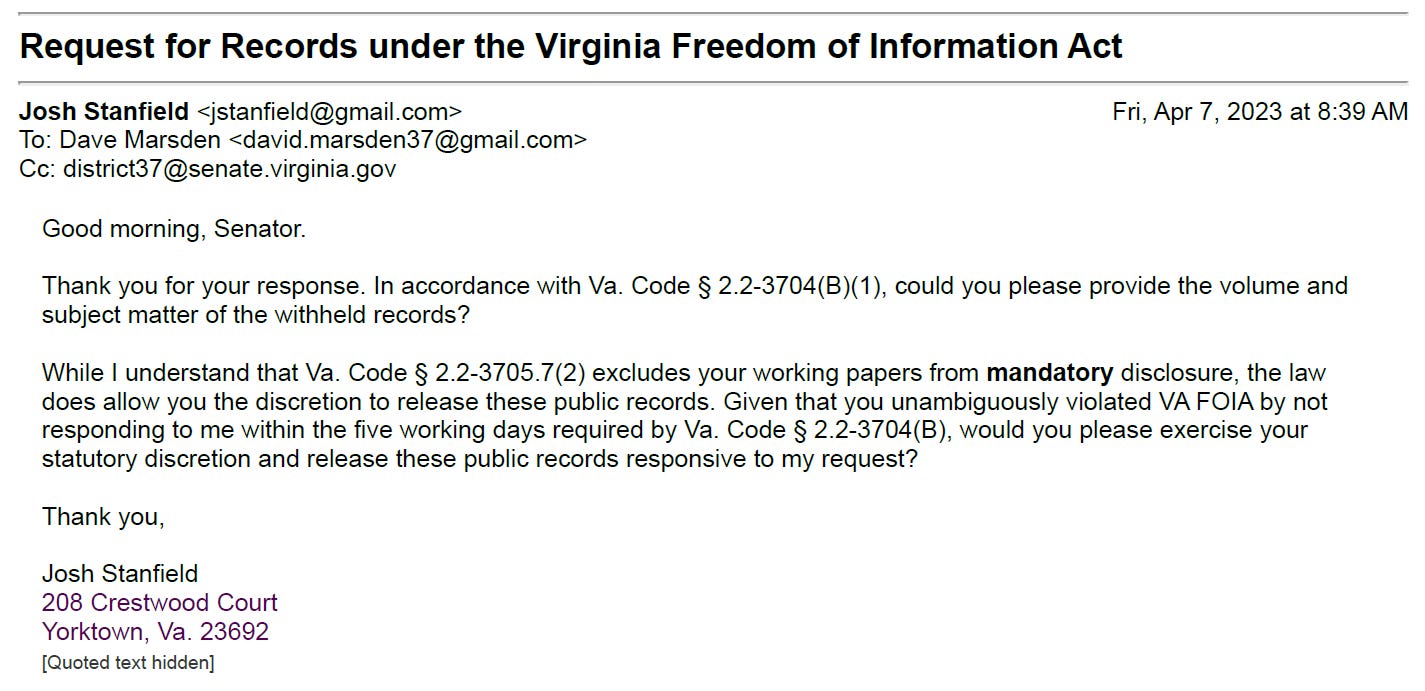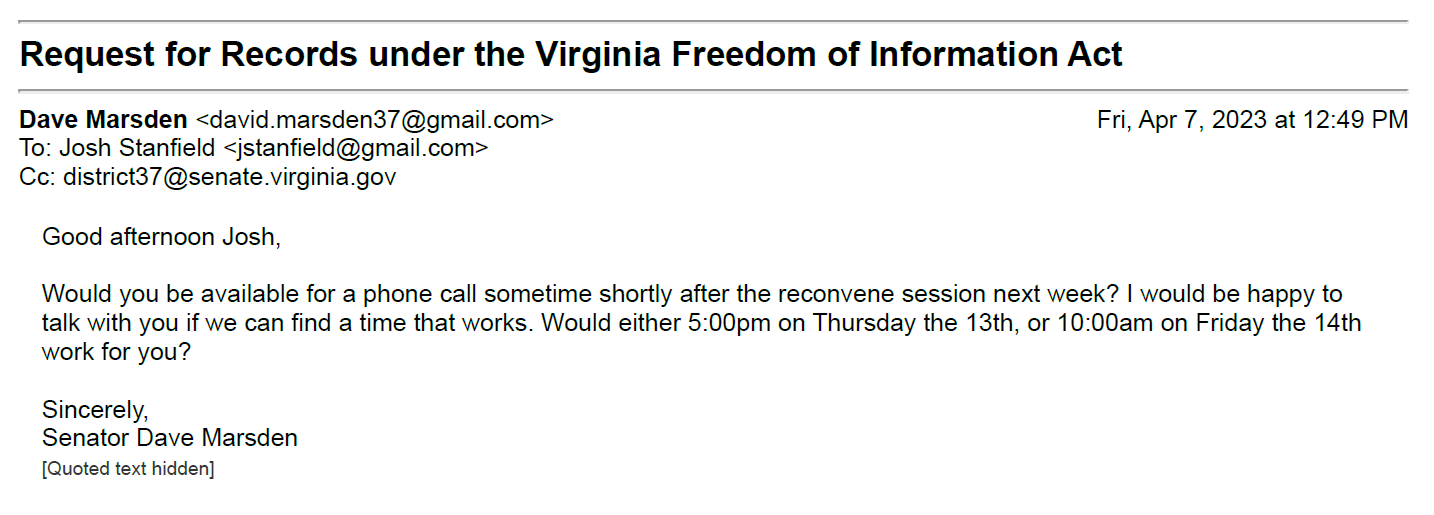This is the Virginia Scope daily newsletter covering Virginia politics from top to bottom. Please consider becoming the ultimate political insider by supporting non-partisan, independent news and becoming a paid subscriber to this newsletter today.
Have a tip? You can reply to this email, or email me directly at Brandon@virginiascope.com
(This is commentary from Josh Stanfield. He is a member of the Democratic State Central Committee.)
by Josh Stanfield
This Friday, May 19 at 9:00 AM, I’ll stand before a judge in the York-Poquoson Circuit Court in my Freedom of Information Act case against State Senator David Marsden.
It didn’t have to be this way.
The FOIA Request & Related Communications
On March 19th, I sent this FOIA request to Senator Marsden for records involving the scandalous dog-breeding company Envigo:
Even though Virginia Code § 2.2-3704(B) requires public bodies to respond to FOIA requests in writing within five working days, I didn’t receive a response and followed up with the Senator on March 30. It wasn’t until April 5 that I received any response at all. Here’s what the Senator sent me:
And here’s the problem: Virginia Code § 2.2-3704(B)(1) requires the public body, if withholding records in their entirety, to “identify with reasonable particularity the volume and subject matter of withheld records, and cite, as to each category of withheld records, the specific Code section that authorizes the withholding of the records.” I responded to Senator Marsden two days later telling him as much:
The Senator’s response? He wanted to talk to me on the phone:
We did end up having a phone conversation, and Senator Marsden was friendly and helpful in explaining the legislative dynamics surrounding Envigo - a realm of policy that I admittedly knew next to nothing about.
But he wouldn’t budge on FOIA. He insisted that, while members of the State Senate must comply with FOIA, he had never disclosed working papers without a court order.
So there I was, confronted with a public body who had blatantly violated the five-working-days required response time under FOIA, who wouldn’t reveal the volume of records he was withholding, and who made it clear he wasn’t going to give me any public records.
The only recourse for me was court - a reality the Senator could’ve totally avoided by simply complying with FOIA in the first place and properly withholding records under the law.
The Office of the Attorney General and a Request to the Governor
On April 20, weeks before I filed my complaint with the court, I sent the Senator a copy as a heads up. On April 25, I was contacted by attorneys with the Office of the Attorney General, informing me that if I were to go ahead with my complaint against the Senator, the AG’s Office would be representing him.
Indeed, ever since that communication, attorneys with the AG’s Office have been communicating with me and employees of the court concerning this case as the Senator’s lawyers.
For non-lawyers like myself, it takes a tremendous amount of time, effort, and research to write a proper complaint pro se, much less navigate the various procedural and logistical hurdles to file and litigate. It also costs money to ask a court to enforce the law, and the bills rocket into the thousands if you want court reporting, transcriptions, and other basics of litigation.
Or you could hire a lawyer (if you can find one to take the case), which certainly isn’t any cheaper.
Those are the burdens a pro se litigant faces. Senator Marsden, on the other hand, can just sit back and relax as the Office of the Attorney General defends him at no charge to the Senator.
Because of this obvious imbalance, and on top of issues of separation of powers, fiscal responsibility in the Executive Branch, fairness to the AG’s Office, and fairness to citizens, I sent a request to Governor Youngkin two days ago to remove the AG’s Office from this case.
Virginia Code § 2.2-510(1) states: “When the Governor determines that, because of the nature of the legal service to be performed, the Attorney General's office is unable to render such service, then the Governor shall issue an exemption order stating with particularity the facts and reasons leading to the conclusion that the Attorney General's office is unable to render such service. The Governor may then employ special counsel to render such service as he may deem necessary and proper. The compensation for such special counsel shall be paid out of the funds appropriated for the administration of the board, commission, division, or department to be represented or whose members, officers, inspectors, investigators, or other employees are to be represented pursuant to this section.”
Pursuant to this section of the Code, Governor Youngkin could issue an exemption order and employ a special counsel to represent Senator Marsden in my case, a lawyer whose fees it seems like the legislature would have to pay.
Regardless of whether or not the Governor acts, I’ll have my day in court on Friday, an opportunity not only for me to find relief under the law, but for our system to reaffirm the sentiment expressed by Chief Justice John Marshall in Marbury v. Madison (1803):
“The Government of the United States has been emphatically termed a government of laws, and not of men. It will certainly cease to deserve this high appellation if the laws furnish no remedy for the violation of a vested legal right.”










How do you figure the AG’s office has a conflict here? Your argument is essentially that since you would have to pay for counsel (which you clearly need), so should the General Assembly. That’s ridiculous. By that reasoning, we just shouldn’t have an Attorney General.
Out of curiosity - why would the author prefer outside counsel to be used in this case? After all, those are additional public funds that, IMO, are completely unnecessary in this case. And it wouldn’t change the fact that he’s a pro se plaintiff going against a member of the Bar.